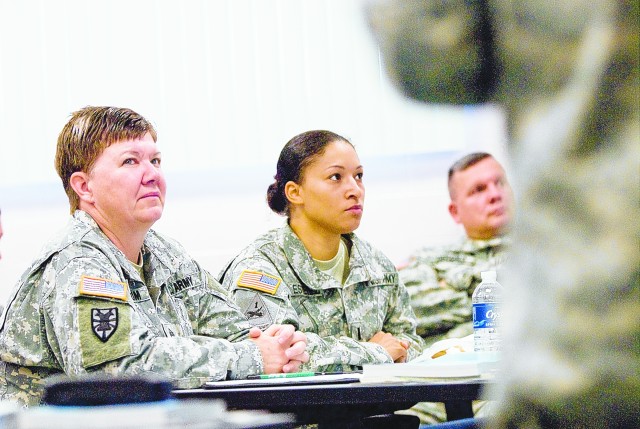FORT MEADE, Md. -- Faced with challenges, how does a Soldier cope and bounce back from adversity'
That is the question Brig. Gen. Rhonda Cornum asked a group of more than 40 senior noncommissioned officers during the first day of the Army's Master Resilience Trainer Course on July 12.
Cornum is the director of Comprehensive Soldier Fitness, a year-old Army-wide program designed to help build a core strength of physical fitness, emotional awareness, social communications, family values and spiritual beliefs.
Part of the CSF initiative is the MRT course, which strives to enhance the resilience and coping skills of Soldiers, family members and Army civilians.
The first CSF mobile training team came to Fort Meade's McGill Training Center with a trial 10-day MRT course before taking the program overseas. The mobile team is scheduled to bring the course to Army installations in Germany and Korea in the fall.
"We have pretty good evidence of what resilience training can do," Cornum said in a briefing to the senior NCOs, who are from installations throughout First Army Division East. "We want everyone to benefit, not just the ones who are at risk."
In an interview after the briefing, Cornum said the Army devised the course to respond to the stresses Soldiers face before and after the frequent deployments that are now required to meet mission goals.
Before the MRT course, there was no program to teach Soldiers how to handle the difficulties of dealing with the work, family and personal problems that are a natural part of life but often intensify during multiple deployments, especially for younger soldiers, Cornum said.
The MRT curriculum includes individual assessments, and virtual and classroom training. The course is aimed at senior noncommissioned officers who educate Soldiers to use the new skills and knowledge at home and in the workplace. Army civilians are also a focus for the course.
In October 2008, Army Chief of Staff Gen. George W. Casey Jr. directed Cornum to find the most knowledgable experts on resilience training in the country. Cornum contacted experts at the Penn Resiliency Project and the Positive Psychology Center, both at the University of Pennsylvania. In the spring of 2009, Army leaders took a look at the project's and center's curriculum and decided to work with their staffs to devise an Army training program.
Last August, the first Army MRT course was taught to a group of 150 senior NCOs in Philadelphia. Since then, more than 1,300 Soldiers have completed the training.
In April, Victory University at Fort Jackson, S.C., opened an MRT center and began teaching the course. Sixty Soldiers have been trained there so far.
"It gave me the tools to help myself," said Sgt. 1st Class Eric Tobin, of the U.S. Army Drill Sergeant School at Fort Jackson, S.C., and a member of the mobile team who attended the August training. "It's helped me to be a better leader. I think it's great."
To meet the Army's goal of having one master resilience-trained Soldier per battalion and brigade, a mobile team of MRT experts was assembled to teach the course at Army installations throughout the U.S. and abroad.
Dana Whitis, a subject matter expert on the team, said eventually there will be more than 5,000 master resilience-trained Soldiers Army-wide. Resiliency training will soon be incorporated at every level in military schools and added to pre- and post-deployment briefings.
The ultimate goal of resiliency training, said Cornum, is to "make better people, which ... makes better Soldiers."


Social Sharing